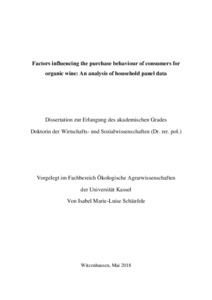| dc.date.accessioned | 2018-07-19T13:26:16Z | |
| dc.date.available | 2018-07-19T13:26:16Z | |
| dc.date.issued | 2018-07-19 | |
| dc.identifier.uri | urn:nbn:de:hebis:34-2018071955851 | |
| dc.identifier.uri | http://hdl.handle.net/123456789/2018071955851 | |
| dc.description.sponsorship | Federal Office for Agriculture and Food (BLE) within the framework of the Federal Programme for Organic Agriculture and Other Forms of Sustainable Agriculture (grant number 2814OE014) | ger |
| dc.language.iso | eng | |
| dc.rights | Urheberrechtlich geschützt | |
| dc.rights.uri | https://rightsstatements.org/page/InC/1.0/ | |
| dc.subject | consumer behaviour | eng |
| dc.subject | wine economics | eng |
| dc.subject | organic food | eng |
| dc.subject | sustainable consumption | eng |
| dc.subject | attitude-behaviour gap | eng |
| dc.subject.ddc | 330 | |
| dc.title | Factors influencing the purchase behaviour of consumers for organic wine: An analysis of household panel data | eng |
| dc.type | Dissertation | |
| dcterms.abstract | Consumer studies based on surveys and purchase experiments show positive attitudes towards organic wine in large consumer segments. However, the market share of organic wine is still small. Apparently, there is a gap between consumer attitudes and real purchase behaviour but no study so far analysed this attitude-behaviour relation in a real market context. Therefore, the present dissertation is based on real market data – household panel data of the GfK (Gesellschaft für Konsumforschung).
The study revealed low levels of expenditure shares for organic wine even in consumer segments with rather positive attitudes towards organic and/or sustainable production. Although this result points to the existence of an attitude-behaviour gap, a statistically significant influence of attitudes towards organic and sustainable production on the purchase of organic wine was revealed. The results suggest potential for the development of targeted marketing strategies in order to increase the hitherto small number of organic wine buyers and to increase the budget share for organic wine (on average 5 %).
Therefore, the identification of purchase barriers, which hinder the translation of attitudes into purchase behaviour took centre stage within the present dissertation. The results suggest that a low level of knowledge regarding organic production is one barrier for purchasing organic wine. Moreover, in light of the still low availability and product assortment of organic wine, preferences for specific countries or regions of origin may hinder consumers purchasing more organic wine. Another relevant purchase barrier for wine consumers in Germany was found to be the price premium of organic wine, especially for low-income consumers.
Consumers were willing to pay price premiums for organic wine in the low- and mid-price segment. However, consumers did not prefer organic over conventional wine in the premium segment, i.e. organic wine producers could not achieve price premiums. Additional benefits beyond the minimum organic requirements need to be communicated to create value for consumers and to gain price premiums in the high-price segment in the long term. The identification of clusters based on consumer attitudes allows for a strategic market development. One of the most attractive segments was found to be the cluster of the “Holistics” which is characterised by strong pro-environmental attitudes and a preference for organic and sustainable products (21 % of wine consumers). Raising awareness for quality benefits of organic wine production within a comprehensive communication strategy on sustainability issues is recommended.
The present dissertation provides an important contribution to research since it was the first study that analysed consumer behaviour for organic wine with real purchase data. Of particular value was the single data source for attitudes and real buying behaviour that allowed the investigation of the attitude-behaviour gap. The results confirmed many results which were previously found by means of stated preference studies. However, attitudes and purchase intentions tend to overestimate actual purchases of organic wine. Stated preference studies, therefore, only provide valid conclusions on antecedents of actual purchase behaviour. | eng |
| dcterms.accessRights | open access | |
| dcterms.creator | Schäufele, Isabel | |
| dc.contributor.corporatename | Kassel, Universität Kassel, Fachbereich Ökologische Agrarwissenschaften, Fachgebiet Agrar- und Lebensmittelmarketing | |
| dc.contributor.referee | Hamm, Ulrich (Prof. Dr.) | |
| dc.contributor.referee | Loose, Simone (Prof. Dr.) | |
| dc.subject.swd | Verbraucherverhalten | ger |
| dc.subject.swd | Weinwirtschaft | ger |
| dc.subject.swd | Biologisches Lebensmittel | ger |
| dc.subject.swd | Verbrauch | ger |
| dc.subject.swd | Nachhaltigkeit | ger |
| dc.subject.swd | Kaufverhalten | ger |
| dc.date.examination | 2018-07-06 | |

